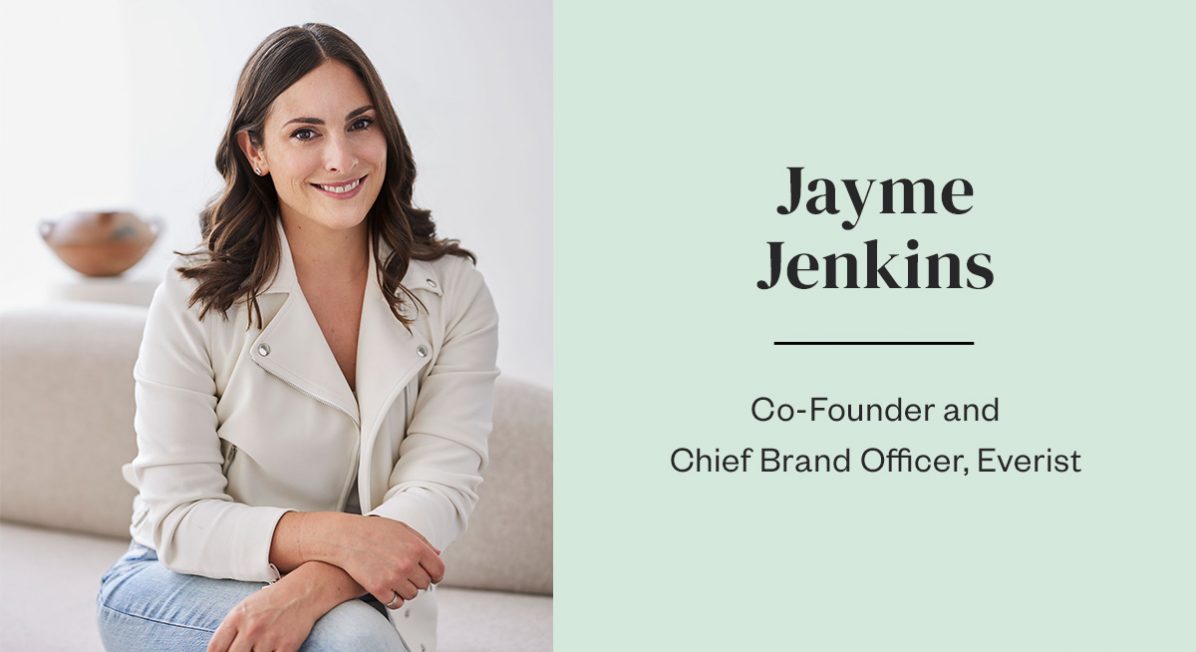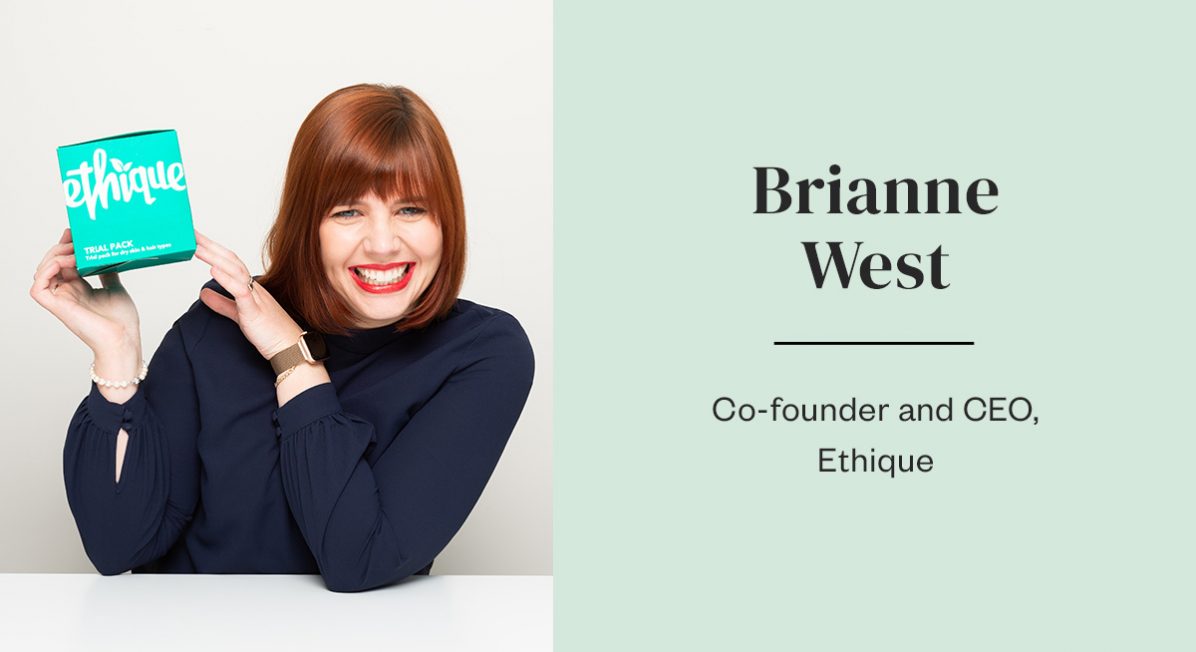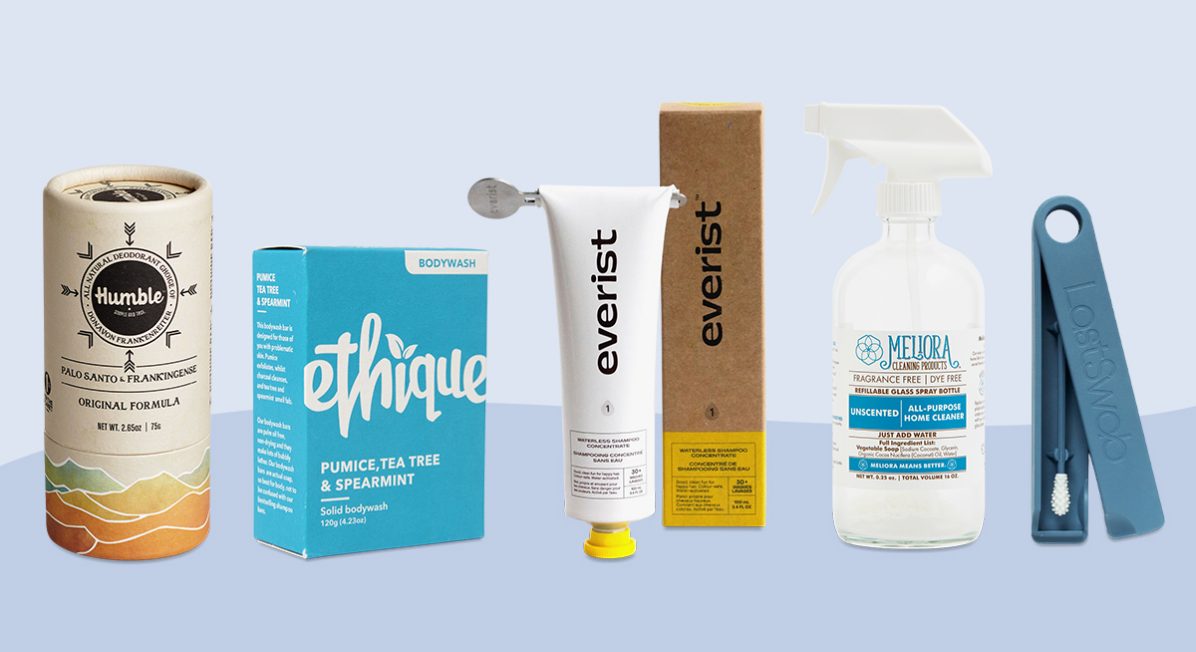5 Sustainable Brands on How They’re Reducing Plastic Waste
Publish Date: July 15, 2022
Last Update: January 26, 2026
How much single-use plastic do you go through in a day? Every drinking straw, bottle of shampoo, produce bag, or set of takeout cutlery adds up: to 300 million tons of plastic waste per year, the vast majority of which is produced by the United States. Globally, only 9% of plastic waste actually gets recycled, meaning more than 90% winds up in landfills, where it takes years to break down, or oceans, where it disrupts ecosystems.
“We’re not going to recycle our way out of the situation we’re in,” says Jayme Jenkins, Co-Founder and Chief Brand Officer at personal care company Everist. That’s why brands like Everist, as well as others dedicated to sustainability (Thrive Market included!), are committed to mitigating plastic waste—by reinventing entire categories, creating innovative packaging, and investing in offsets.
How Thrive Market is Reducing Plastic
A big part of becoming the world’s first climate-positive grocery store is addressing the problem of plastic. In 2021, we achieved plastic-neutral packaging for all products made exclusively by Thrive Market, including our Thrive Market Goods daily essentials, Rosey cleaning products, wellmade supplements, and f.a.e. clean beauty products.
Our next goal is to offset all plastic shipping materials in member orders to reach plastic-neutral shipping in 2023.
Plastic waste in the consumer products industry is something we can’t tackle alone. We talked to experts from five sustainable brands available at Thrive Market about how they’re doing their part to help address one of the world’s most urgent environmental problems.
5 Founders on a Mission

Jayme Jenkins is the Co-founder and Chief Brand Officer at Everist, a hair and body care brand offering waterless shampoo and conditioner concentrates that are ⅓ the size of traditional shower products, packaged in aluminum tubes. The only plastic Everist uses is for their caps, which can be sent back to the brand for recycling.
Try: Everist Waterless Shampoo Concentrate

Kristin Moore is the Director of Product Development of Humble Brands, whose natural deodorants are available in biodegradable paperboard packaging. Any plastic packaging they use is made from 75% post-consumer waste, which is higher than the industry standard. The company is working on transitioning more existing products into paperboard packaging.
Try: Humble Deodorant, Palo Santo & Frankincense

Isabell Aagaard is the Founder of LastObject, a brand that has reinvented traditionally single-use items like cotton swabs, tissues, and cotton pads using materials that are sustainable and durable, like certified recycled ocean-bound plastic (for product cases) and FSC Certified recycled paper (for cartons). Their reusable cotton swab can replace up to 1,000 disposable swabs.
Try: Last Swab Basic

Brianne West is the Co-Founder and CEO of Ethique, an Australian brand that makes high-quality skin, hair, and body care products in bar form, sans plastic packaging. To date, the company has helped keep more than 20 million plastic bottles out of landfills (and their next benchmark is 500 million by 2030).
Try: Ethique Solid Bodywash, Pumice, Tea Tree & Spearmint

Kate Jakubas is the Founder and COO of Meliora, a brand of natural and sustainable cleaning products. By offering products packaged with paper, cardboard, glass, and metal, as well as water-free products in refill tablet form, the company is on its way to replacing 2 million plastic bottles.
Try: Meliora All-Purpose Cleaner and Refill Tablets
On the biggest challenges of plastic:
Jenkins: “How fragmented recycling programs are across the country! It makes it difficult to give one-size-fits-all instructions for disposing of products once you’re done with them.”
Moore: “Some plastics that may be able to biodegrade can only do so in specific industrial composting facilities, which are very limited in availability. Paper has been our choice as the most sustainable option we can find.”
Aagaard: “Sustainability is an ever-changing field. New materials are created that are better than before, new possibilities in manufacturing arise, and new knowledge comes to the table. There is no one answer or one truth about anything, and there is nothing that is absolutely 100% zero [carbon] footprint. You can only create something to be the most sustainable right now.”
West: “Tackling the perceptions around sustainable beauty products. When we first started creating our range of solid shampoos, conditioners, and facial cleansers ten years ago, beauty bars were really hard to find. And a lot of the time…they were essentially a soap bar in disguise. So when we hit the market, consumers had a lot of preconceptions. Once they try it, they love it, but we have a lot of work to get them to that point, particularly if they’ve had a bad experience with another bar in the past.”
Jakubas: “There is so much information out there confusing people on what is and isn’t recyclable. We’ve been taught for years that anything with that little recycling arrow triangle magically gets recycled when we throw it in our blue bins on the curb but that couldn’t be further from the truth. The easiest way to help reduce this problem isn’t finding new ways to recycle what we continue to make and throw away—it’s to stop using these single-use plastic items in the first place and opting for better options.”

On what they want consumers to understand about plastic:
Jenkins: “All packaging materials have pros and cons. Plastic is light, durable, and inexpensive. It also can only be downcycled once and breaks down into microplastics that enter our water systems and eventually our food chain. Aluminum is not perfect either, but it can be infinitely recycled over and over again so it retains its high resale value, giving added incentive for processors to recycle it.”
Moore: “I hear a lot of consumers wanting to completely eliminate plastic, and I don’t think that is realistic. I think the biggest thing to think about with plastics is that they are already here. Completely eliminating plastics is nearly impossible. We need to turn our focus toward more circularity and end-of-life solutions for plastics, as well as using post-consumer recycled materials and plastics diverted from entering the oceans.”
Aagaard: “People often get too caught up in what [something] is made of and how it can be disposed of, which are valid questions, but what they sometimes forget is how long it will be used. The most sustainable chair is not the one made of cardboard, it’s the one that has lasted for decades, been used in multiple homes, and sold between families. It’s the chair that’s been taken care of and fixed if needed. Sustainability is very much about quality.”
West: “One of the biggest misconceptions is that, because plastic can theoretically be recycled, if you put it in your recycling bin it actually does get recycled. Even when consumers go to all the effort of cleaning and separating their empties, issues with global recycling infrastructure means nine out of ten plastic containers don’t get recycled. Some get incinerated, some wash off into our oceans and rivers, some get sent to landfill (often exported by high-income nations to low-income nations, to sit in landfill there).”
Jakubas: “Unfortunately, the material that makes up [laundry detergent] sheets and pods is a type of plastic! Polyvinyl acetate (sometimes referred to as PVA or PVOH) [Ed note: sometimes considered an alternative to plastic] is yet another form of plastic; it’s moved from the obvious jug to the product itself (which dissolves into plastic soup and ends up in our waterways). Wastewater systems in the U.S. don’t have the processing in place to properly biodegrade, or break down, this plastic soup. As a result, we’ve traded ‘wishcycling’ plastic jugs to adding plastic directly to our waterways.”
On the industry-wide changes they want to see:
Jenkins: “As brands, it’s important to ask—how can we first make the product more sustainable itself? Does it really need this external packaging, carrying case, etc.?”
Moore: “I think the more our industry works to eliminate plastics and choose more sustainable options for packaging, we increase the demand for alternatives to plastics. We all have to work together to overcome these obstacles.”
Aagaard: “More transparency. It takes a lot of time and effort to keep up with trends and innovations, and having more transparency would help brands and manufacturers throughout the world.”
West: “One of the most effective things we can do as an industry is share best practice. If we want to be genuinely sustainable, we need to share what we know about clean supply chains, sourcing sustainable ingredients, working fairly with suppliers, and eliminating unnecessary waste. Ultimately, the more organizations are able to adopt gold standard working practices on sustainability and ethical sourcing, the better the world will be for everyone on it.”
Jakubas: “Manufacturer ownership of the plastic problem. For decades companies have told people that recycling is ‘your problem’ while continuing to pump out single-use trash. We need to rethink our packing designs, material choices, and thoughts around reuse and end-of-life.”
How to Reduce Single-Use Plastic Every Day
Our experts agree: reducing your single-use plastic use isn’t easy. That said, every step counts, so start small with these low-waste tips:
- Make a few key reusable swaps with this Plastic-Free Home Essentials Shopping List or Low-Waste Living Shopping List.
- You know about canvas totes for groceries, but what about those plastic produce bags? Next time, bring reusable cloth bags for your apples, onions, and kale (or just skip the bags entirely).
- Get in the habit of keeping a reusable water bottle and mug with you when you’re on the go.
- Think about the lifespan of any purchase: how long will you use it (and love it)? (Low-waste lifestyle expert Kathryn Kellogg told us she waits 30 days before purchasing non-essential items, to make sure she really wants it.)
- Shop by Thrive Market’s packaging-conscious values, including Plastic-Free .